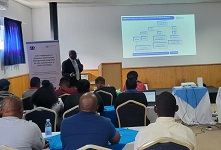The United Nations Economic Commission for Africa (ECA) trained officials from key government ministries during a four (4) day applied training program on the integrated Planning and Reporting Toolkit (IPRT), from 3 – 6 April 2023, in Berea, Lesotho.
The training was organized by the Development Planning Section of the Macroeconomics & Governance Division, in collaboration with the United Nations Development Programme (UNDP) and the Lesotho Ministry of Finance and Development Planning.
Many countries like Lesotho, are signatory to global and regional agendas such as the 2030 Agenda for Sustainable Development Goals (SDGs) and Agenda 2063. To ensure implementation of these commitments, countries must align and integrate these agendas into their national development plans. Integrated development planning frameworks that: reflect countries national development plans, and varied regional and global commitments, targets, and goals; are aligned with financial frameworks; appropriately identify catalytic and transformational interventions; and are continually tracked and calibrated to respond to emerging crises and shocks are vital for ensuring value-for money in the use of national resources.
The training comes at an opportune time for Lesotho which is in the process of revising its Second National Strategic Development Plan (NSDP II) to make it coherent with the emerging priorities and aspirations of the government, as well as integrate its commitments to the 2030 Agenda for Sustainable Development Goals, Agenda 2063, and the SADC Regional Indicative Strategic Development Plan 2030 (RISDP) under a challenging post-COVID environment. A presentation was also made on how to carry out the integration of national with international commitments as the Development Plan is being revised. The IPRT will also serve to better track progress through the alignment of the NSDP II’s results framework at goal, target and indicator levels with the SDGs and Agenda 2063.
Mr Posto Sofonia, Development Coordination Officer, Results, Monitoring and Reporting, from the UN Coordinator’s Office committed the support of the UN Resident Coordinator’s Office in Lesotho to the work that has started. He stated that we “are aware of what needs to be done to finalise and are ready to support.” He also reflected that it will be good to see all UN Lesotho involved and not only UNDP.
Lesotho is the fourth country in the Southern African Development Community region (SADC) to be trained on the IPRT after Botswana, Malawi and Zambia and it is anticipated that the toolkit will be formally adopted at the end of the training session. Mrs Pontso Josephine Mpakanyane, Chief Economic Planner from the Ministry of Finance and Development Planning in the closing session appreciated the support from the UN Resident Coordinator’s Office, and everyone for engaging in all the sessions. She noted that “tracking of performance is important in tracking the progress, and the toolkit is important to align Agenda 2030 and Agenda 2063 to the development plan.” She urged all participants to continue the momentum and will engage on how best to solve identified challenges.
Mr. Bartholomew Armah, Chief of the Development Planning Section, underscored the important role that the IPRT can play in aligning national budgets to development plans to facilitate implementation. He also emphasized the need to strengthen statistical systems to track performance of the development plan and initiate corrective measures as needed.
The IPRT has already been deployed in 27 member States and one Regional Economic Community (SADC) with ongoing efforts to ensure its use by other countries on the continent. The countries that have so far engaged with the IPRT with the support of ECA are Algeria, Benin, Botswana, Burkina Faso, Cameroon, Comoros, Republic of Congo, Cote d’Ivoire, Egypt, Ethiopia, Gambia (Republic of The), Ghana, Guinea, Liberia, Malawi, Mauritania, Morocco, Namibia, Niger, Senegal, Seychelles, Sierra Leone, Sudan, Uganda, United Republic of Tanzania, Zimbabwe and Zambia.
